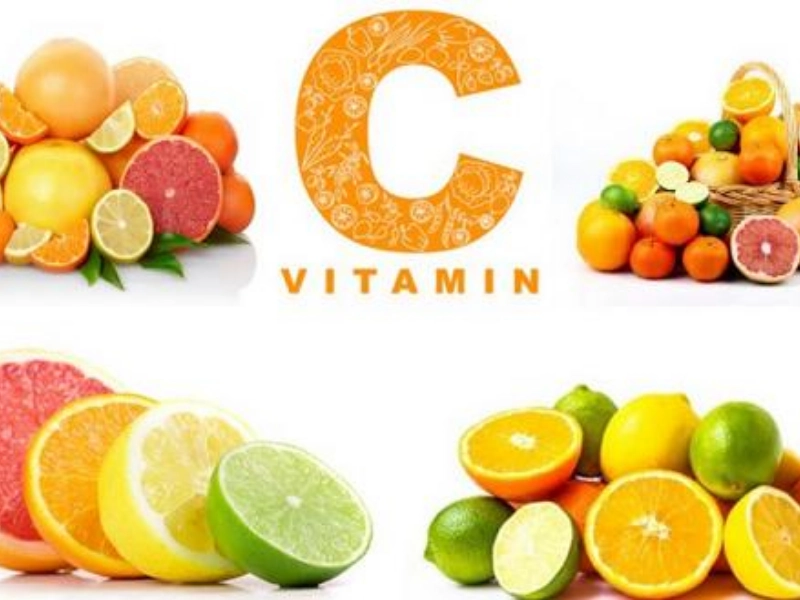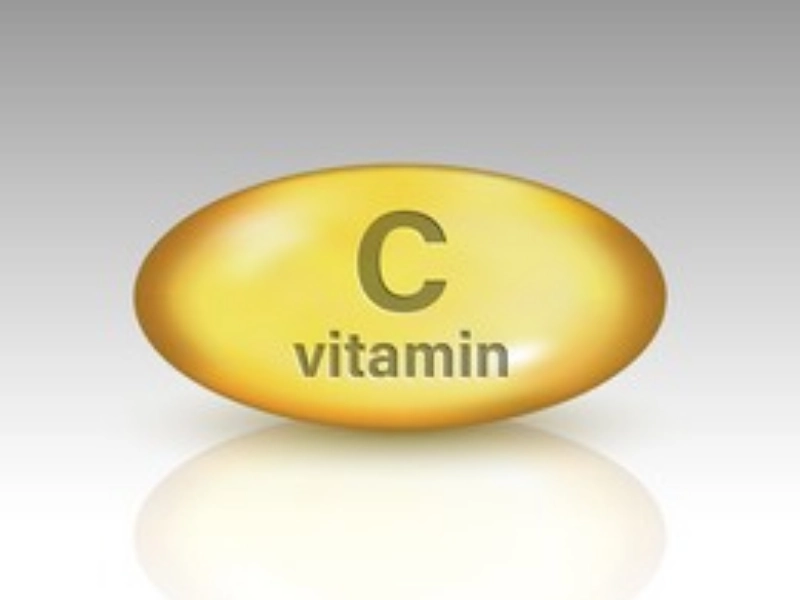1. Value of Functional Blood Vessels

 Crucially for many body processes, vitamin C, sometimes referred to as ascorbic acid, is water-soluble. Its strong antioxidant action and support of the immune system are well-known. Maintaining the integrity and structure of blood vessels depends on collagen synthesis, which vitamin C helps create. The body cannot generate vitamin C on its own; hence it is imperative to get it from food or supplements to guarantee enough levels for the best health.
3. Vitamin C's Antioxidant Attributes
Crucially for many body processes, vitamin C, sometimes referred to as ascorbic acid, is water-soluble. Its strong antioxidant action and support of the immune system are well-known. Maintaining the integrity and structure of blood vessels depends on collagen synthesis, which vitamin C helps create. The body cannot generate vitamin C on its own; hence it is imperative to get it from food or supplements to guarantee enough levels for the best health.
3. Vitamin C's Antioxidant Attributes
 Vitamin C's antioxidant power is one of its essential functions in preserving proper blood vessels. Antioxidants assist free radicals—unstable chemicals that could harm tissues and cells, including those in the cardiovascular system—in neutralizing themselves. Vitamin C protects the endothelial cells lining blood arteries by lowering oxidative stress, therefore fostering their health and function. Preventing diseases such as atherosclerosis, in which plaque accumulates in the arteries and causes decreased blood flow and a higher risk of heart disease, depends on this protective action.
4. Blood vessel integrity and collagen manufacture
Vitamin C's antioxidant power is one of its essential functions in preserving proper blood vessels. Antioxidants assist free radicals—unstable chemicals that could harm tissues and cells, including those in the cardiovascular system—in neutralizing themselves. Vitamin C protects the endothelial cells lining blood arteries by lowering oxidative stress, therefore fostering their health and function. Preventing diseases such as atherosclerosis, in which plaque accumulates in the arteries and causes decreased blood flow and a higher risk of heart disease, depends on this protective action.
4. Blood vessel integrity and collagen manufacture
 Collagen, a protein giving blood vessels strength and structure, depends on vitamin C for synthesis. For blood artery walls, collagen fibers create a supporting structure that guarantees their continued flexibility and strength. Maintaining blood vessel wall integrity and avoiding their weakening or damage depend on enough vitamin C levels. Correct blood flow and general cardiovascular health depend on this structural support, which emphasizes the need of vitamin C in preserving good blood vessels.
5. Component in Control of Blood Pressure
Collagen, a protein giving blood vessels strength and structure, depends on vitamin C for synthesis. For blood artery walls, collagen fibers create a supporting structure that guarantees their continued flexibility and strength. Maintaining blood vessel wall integrity and avoiding their weakening or damage depend on enough vitamin C levels. Correct blood flow and general cardiovascular health depend on this structural support, which emphasizes the need of vitamin C in preserving good blood vessels.
5. Component in Control of Blood Pressure
 Studies point to vitamin C possibly helping to control blood pressure. Higher vitamin C consumers often have lower blood pressure, according to studies. The capacity of vitamin C to enhance endothelial function and stimulate vasodilation—the widening of blood vessels—helps to explain this impact. Further supporting cardiovascular health is vitamin C's ability to increase blood flow and lower circulatory system resistance, therefore helping to maintain normal blood pressure values.
6. Vitamin C's Food Sources
Studies point to vitamin C possibly helping to control blood pressure. Higher vitamin C consumers often have lower blood pressure, according to studies. The capacity of vitamin C to enhance endothelial function and stimulate vasodilation—the widening of blood vessels—helps to explain this impact. Further supporting cardiovascular health is vitamin C's ability to increase blood flow and lower circulatory system resistance, therefore helping to maintain normal blood pressure values.
6. Vitamin C's Food Sources
 One practical approach to guarantee enough consumption is including foods high in vitamin C in the diet. The best supplies of this essential vitamin are fruits and vegetables. High vitamin C content in citrus fruits, including oranges, lemons, and grapefruits, makes them well-known. Additional great sources are bell peppers, broccoli, spinach, strawberries, and kiwi. Including a range of these items in regular meals helps people to readily satisfy their vitamin C requirements and support good blood vessels.
7. Suggested Daily Consumption
One practical approach to guarantee enough consumption is including foods high in vitamin C in the diet. The best supplies of this essential vitamin are fruits and vegetables. High vitamin C content in citrus fruits, including oranges, lemons, and grapefruits, makes them well-known. Additional great sources are bell peppers, broccoli, spinach, strawberries, and kiwi. Including a range of these items in regular meals helps people to readily satisfy their vitamin C requirements and support good blood vessels.
7. Suggested Daily Consumption
 Vitamin C consumption advised daily differs depending on age, gender, and stage of life. For most individuals, the advised daily limit (RDA) is roughly 75 mg for women and 90 mg for men. Higher oxidative stress levels mean that smokers and others under more stress may need more. Although dietary sources are usually the best way to get vitamin C, some people should think about supplements if their diet alone fails to meet their daily needs. Before beginning any supplements, one should see a healthcare practitioner.
8. Lifestyle elements influencing blood vessel condition
Vitamin C consumption advised daily differs depending on age, gender, and stage of life. For most individuals, the advised daily limit (RDA) is roughly 75 mg for women and 90 mg for men. Higher oxidative stress levels mean that smokers and others under more stress may need more. Although dietary sources are usually the best way to get vitamin C, some people should think about supplements if their diet alone fails to meet their daily needs. Before beginning any supplements, one should see a healthcare practitioner.
8. Lifestyle elements influencing blood vessel condition
 Apart from nutritional consumption, various lifestyle choices might affect blood vessel condition. Maintaining good blood circulation and advancing general cardiovascular health depend on regular physical activity. Exercise can help regulate blood pressure and help endothelial function to be improved. Protection of blood vessel integrity also depends critically on avoiding smoking and controlling stress levels. Blood vessel condition can be much improved by combining a good lifestyle with a diet high in vitamin C.
9. Tracking Blood Vessel Conditions
Apart from nutritional consumption, various lifestyle choices might affect blood vessel condition. Maintaining good blood circulation and advancing general cardiovascular health depend on regular physical activity. Exercise can help regulate blood pressure and help endothelial function to be improved. Protection of blood vessel integrity also depends critically on avoiding smoking and controlling stress levels. Blood vessel condition can be much improved by combining a good lifestyle with a diet high in vitamin C.
9. Tracking Blood Vessel Conditions
 Monitoring blood vessel operation is crucial for those worried about their cardiovascular condition. Regular visits to doctors can help evaluate general cardiovascular health, cholesterol, and blood pressure. If any worrisome symptoms develop, such as dyspnea or chest discomfort, it is imperative to see a doctor right away. Knowing personal health indicators helps people to make required dietary changes and lifestyle adjustments to support good blood vessels.
10. Synopsis of Vitamin C Advantages
Monitoring blood vessel operation is crucial for those worried about their cardiovascular condition. Regular visits to doctors can help evaluate general cardiovascular health, cholesterol, and blood pressure. If any worrisome symptoms develop, such as dyspnea or chest discomfort, it is imperative to see a doctor right away. Knowing personal health indicators helps people to make required dietary changes and lifestyle adjustments to support good blood vessels.
10. Synopsis of Vitamin C Advantages
 Through its antioxidant qualities, support of collagen generation, and possible impacts on blood pressure control, vitamin C is essential for preserving normal blood vessels. Those who have a good lifestyle and include foods high in vitamin C in their diet can improve their cardiovascular condition and encourage efficient blood circulation. Understanding the value of this vital vitamin helps people to make wise food decisions that support general health and lifespan. Accepting the advantages of vitamin C will help one have a better life and have better blood vessel condition.
Through its antioxidant qualities, support of collagen generation, and possible impacts on blood pressure control, vitamin C is essential for preserving normal blood vessels. Those who have a good lifestyle and include foods high in vitamin C in their diet can improve their cardiovascular condition and encourage efficient blood circulation. Understanding the value of this vital vitamin helps people to make wise food decisions that support general health and lifespan. Accepting the advantages of vitamin C will help one have a better life and have better blood vessel condition.